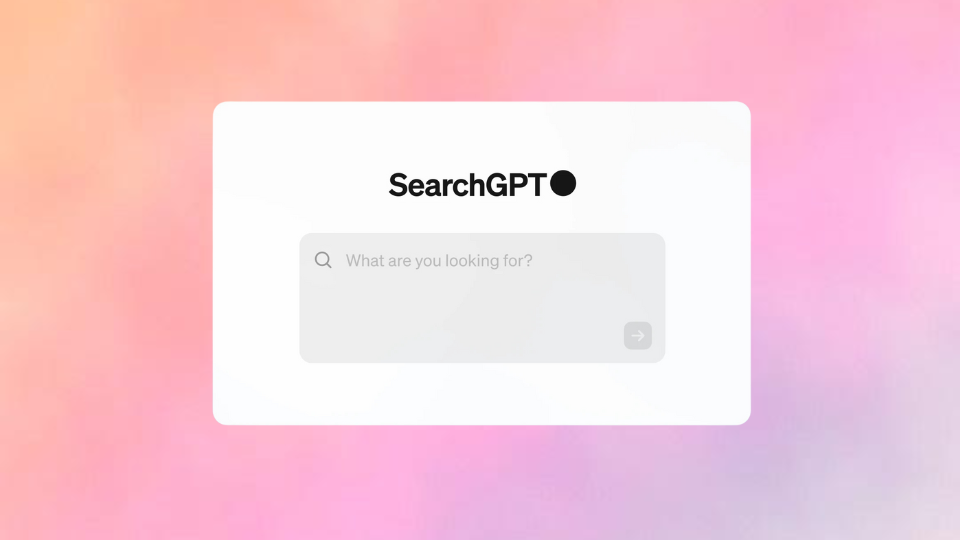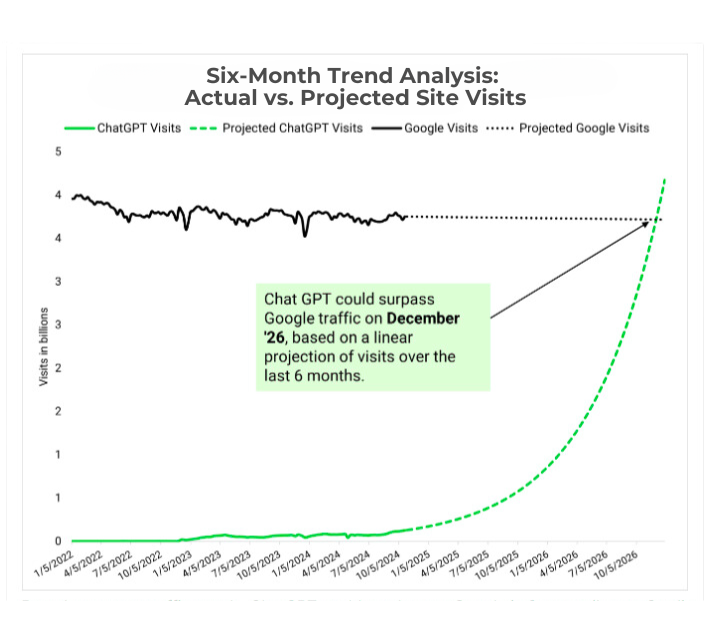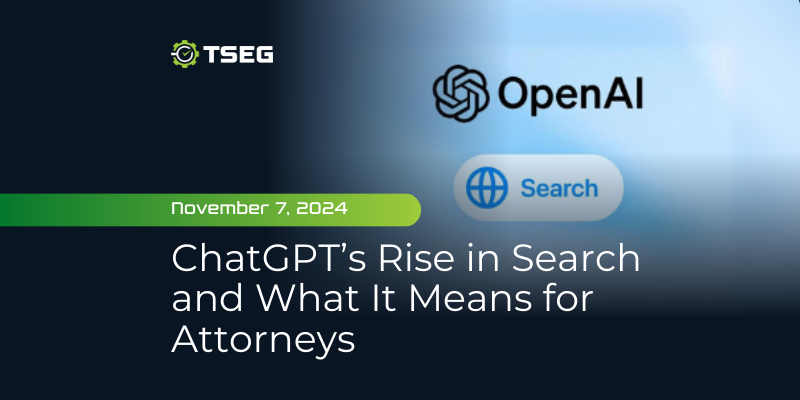ChatGPT’s Rise in Search and What It Means for Attorneys
Posted on Thursday, November 7th, 2024 at 4:51 pm
ChatGPT’s Role in Shifting the Search Experience
The world of search engines is witnessing a pivotal shift with the introduction of ChatGPT’s capabilities. Unlike traditional keyword-centric searches popularized by Google, ChatGPT, developed by OpenAI, offers a conversational approach that sets it apart. This new method doesn’t just produce lists of results—it creates an experience where users feel heard and understood.
At the heart of ChatGPT’s search function is an AI model that can understand context, tailor responses to nuanced inquiries, and engage in follow-up questions. This added layer of personalization appeals to users seeking more than basic, direct answers. The legal industry, where complex and multifaceted queries are common, may find this particularly useful. Imagine clients asking about a specific type of case or seeking preliminary insights before consulting with a firm; the conversational AI can simulate a helpful, albeit non-binding, first point of contact.
This emerging role of ChatGPT points to a new era, challenging the status quo established by traditional engines. While its benefits are clear, it also presents new questions for law firms. How can this tool be integrated into legal marketing strategies, and where might it fall short compared to the established leader, Google?
Google’s Response to the AI Surge
As ChatGPT carves out a space in the search world, Google is not standing idle. The tech giant has long been synonymous with search, adapting over the years to introduce innovations like semantic search, voice search, and enhanced local results. Now, with the rise of conversational AI, Google is advancing its technology to maintain its leading position.
Google has ramped up its AI tools to meet the new demands set by ChatGPT’s personalized approach. Integrating conversational capabilities into its existing ecosystem, Google is refining how it handles complex, natural language questions. This shift matters for law firms because it could mean changes in search algorithms and how information is ranked and delivered. Staying updated on these changes is vital for maintaining effective digital marketing strategies.
The competition between these search platforms signals more than a race for user attention—it represents a new set of expectations in search behavior. Law firms must consider how these developments may influence visibility, engagement, and client acquisition in a market where AI-driven experiences are becoming more valuable.
ChatGPT’s Strengths in a User-Centric World
ChatGPT’s AI-based approach introduces advantages that appeal to users looking for tailored responses. Its ability to interpret and respond to questions in a conversational manner results in answers that are contextually relevant, unlike the straightforward lists of links provided by traditional search engines. This engaging interaction mimics human dialogue, offering potential clients a more inviting way to explore legal information or ask questions.
The Challenge of Static Information
Despite its strengths, ChatGPT comes with significant limitations, primarily stemming from its reliance on static data. Unlike Google, which continuously updates its search index to reflect the latest information across the web, ChatGPT operates based on training data that may not include recent updates. This makes it less reliable for real-time inquiries or when accessing the latest legal precedents or regulatory changes is crucial.
What This Means for Attorneys
For law firms, understanding these strengths and limitations is essential. ChatGPT could be a valuable addition to a digital strategy for tasks like preliminary research or client engagement where immediate, contextually rich responses are beneficial. However, it should not be the primary source for real-time legal updates or current events due to its static knowledge base.
Balancing ChatGPT’s potential with awareness of its constraints can enable law firms to use it more effectively. The key lies in knowing when its capabilities complement the more dynamic, constantly updated sources like Google.
The Monetization Puzzle
One of the most significant hurdles ChatGPT faces is the lack of a clear path to monetization. Google’s long-standing success in search is deeply rooted in its ability to generate substantial revenue through an ad-driven model. This system not only supports its expansive suite of search features but also fuels continuous innovation and development.

In contrast, ChatGPT does not currently have an equivalent advertising model embedded in its search capabilities. While its user-centric approach provides value, the absence of a revenue stream poses questions about its long-term sustainability. Without a profitable monetization strategy, scaling ChatGPT to compete on the same level as Google becomes a daunting task. For law firms considering the implications, this financial gap could influence whether ChatGPT remains a strong player or eventually faces constraints in growth and improvement.
The legal marketing world thrives on reaching potential clients through reliable and widespread platforms. If ChatGPT struggles to sustain its development due to monetization challenges, its future role in this space may be impacted, making Google’s more traditional search model remain the top choice for many firms.
The Future of Search and Legal Marketing
The rise of AI-driven tools like ChatGPT is changing how people interact with search engines and the expectations they have for online research. For law firms, this shift brings both opportunities and challenges. As more users get accustomed to conversational AI, the demand for personalized, context-aware interactions will likely grow. This trend could affect how firms approach client engagement and content strategies.
Adjusting to these changes may involve rethinking how content is created and optimized for search engines that focus on user interaction. Google’s push to incorporate similar conversational features into its platform highlights the need for staying informed. Law firms that tailor their strategies to produce more client-focused, informative content can maintain an edge in a competitive market.
While ChatGPT introduces new ways to engage with users, the reliance on AI technology requires ongoing attention. Firms should remain flexible, ensuring their marketing plans align with both current trends and future advancements in search technology.
Partner with TSEG
The rise of ChatGPT and Google’s response signal a major change in how search functions. For law firms, staying aware of these shifts is important to keep visibility and attract new clients. Adjusting strategies as search practices change is necessary to stay ahead.
TSEG is prepared to guide law firms through these shifts. With extensive experience in legal marketing, TSEG offers customized services to help firms use the most effective tools. From developing client-focused content to refining digital strategies, TSEG helps ensure your firm connects with potential clients. Partnering with TSEG means your firm can face changes in the industry with confidence and continue to grow its reach.
